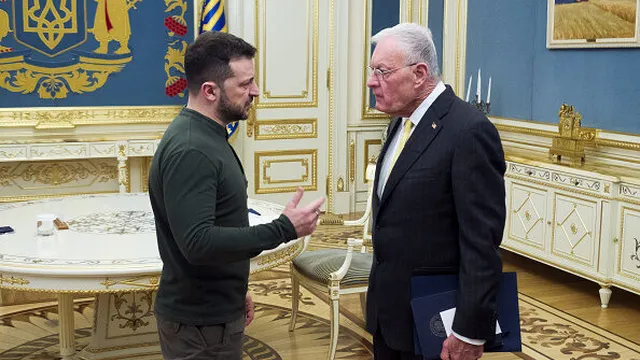
Kellogg proposes partitioning Ukraine like post-war Berlin
2025-04-13 09:00- Keith Kellogg proposed that zones of control for British and French troops could be established in western Ukraine.
- Ukraine would have to cede the eastern territories occupied by Russia under this plan.
- The suggestion has prompted criticism and concern regarding the future territorial integrity of Ukraine.
Express your sentiment!
Insights
In an interview, Keith Kellogg, a retired lieutenant general and special envoy for Ukraine from the Trump administration, proposed that Ukraine could be partitioned similarly to Berlin after World War II. This plan consists of establishing zones of control for British and French troops in the western part of Ukraine, while Russian forces would occupy the east. This division would also involve Ukrainian forces positioned between the British and French troops and the Russian army, as well as a proposed demilitarized zone to prevent conflicts. Kellogg emphasized that this arrangement would help ensure true military oversight and stability in the region. The idea of a partition raises significant concerns in Kyiv, as it implies surrendering eastern territories currently under Russian control. Kellogg has previously stated that the inclusion of allied forces would not be provocative to Russia, suggesting that the positioning of these forces is strategically designed to maintain peace and stability in Ukraine. Although Kellogg's proposal may have tactical merit, his comparisons to post-war arrangements in Berlin have drawn criticism and may not resonate well with Ukrainian leaders, who fear losing essential territory. The proposal comes amid ongoing tensions in Ukraine, with Russian drone strikes resulting in casualties and damage to Ukrainian infrastructure. Kellogg's plan is seen as part of a broader negotiation effort by the United States to reach a ceasefire, which includes direct discussions between Trump’s envoy Steve Witkoff and Russian President Vladimir Putin. Kremlin representatives have consistently rejected the notion of peacekeeping troops from NATO countries, complicating the potential for this peace deal in the face of rising violence and aggressions. While Kellogg's suggestion aims to create a framework for peace, it raises further questions about the future of Ukraine; implementing this plan could set a dangerous precedent for other nations under similar threats. Observers in Ukraine and abroad will be keen to see how U.S. diplomacy unfolds in the context of these proposals, especially considering the complex geopolitical implications of redefining territorial boundaries and the accountability and legitimacy of Ukraine’s leadership moving forward.
Contexts
The Ukraine-Russia conflict, which has its roots in historical, political, and cultural complexities, escalated significantly in 2014 with Russia's annexation of Crimea. This event marked a turning point that prompted international condemnation and led to sanctions against Russia by the United States, the European Union, and other nations. The Ukrainian government, facing unrest in the eastern regions of Donetsk and Luhansk, accused Russia of supporting separatist movements, a claim that Russia has consistently denied while asserting its interest in protecting Russian-speaking populations in Ukraine. The annexation of Crimea followed a disputed referendum in which residents of Crimea voted to join Russia, a move that was widely rejected by the international community, viewing it as a violation of Ukrainian sovereignty and international law. Consequently, the ongoing conflict has resulted in significant military confrontations, loss of lives, and humanitarian concerns, marking one of the most serious confrontations in Europe since the Cold War era. In addition to military confrontations, the conflict has had profound political implications for both Ukraine and Russia. Ukraine has shifted its foreign policy towards the West, seeking integration into European and NATO structures, while fighting against corruption and implementing reforms to align with Western standards. The conflict has sparked a national identity crisis in Ukraine, with many individuals asserting their Ukrainian identity in stark opposition to Russian influence. On the other hand, the conflict has fueled nationalism within Russia, where the government portrays itself as a protector of ethnic Russians abroad. This narrative has been leveraged to consolidate domestic support for the Kremlin, despite the adverse economic impacts resulting from international sanctions and military expenditures. The humanitarian impact of the Ukraine-Russia conflict has been catastrophic, with thousands of civilians killed and millions displaced. UN estimates suggest that over 5 million people require humanitarian assistance, facing challenges related to access to basic services, health care, and education, particularly in conflict-affected areas. Schools and hospitals have suffered infrastructural damage due to ongoing hostilities, exacerbating the already dire living conditions. Non-governmental organizations and humanitarian agencies continue to operate in the region, striving to provide relief to those affected, but their efforts are often hampered by ongoing violence and bureaucratic restrictions. Efforts for a peaceful resolution of the conflict, primarily through the Minsk agreements, have seen limited success. Ceasefires have been repeatedly violated, and the political will among involved parties appears fluctuated. The negotiations have been complicated by the changing dynamics of regional and global politics, particularly the role of Western powers and the evolving strategies of Russia. As of 2025, while there have been calls for renewed dialogue, hostilities continue, and the situation remains tense and volatile, highlighting the necessity for a long-term and sustainable solution to restore peace and stability in the region.